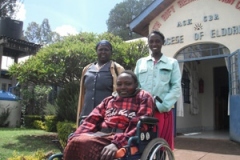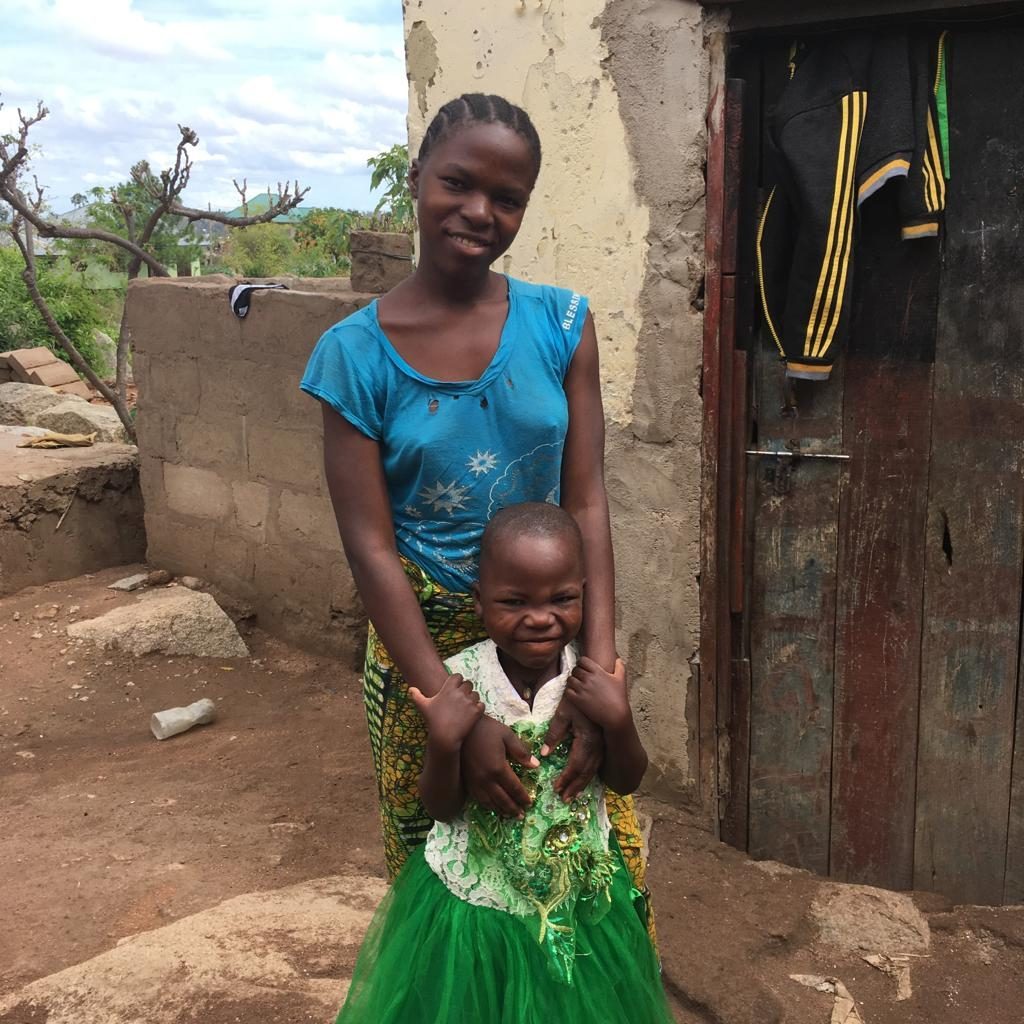Acceptable Use Policy
This acceptable use policy sets out the terms between you and us under which you may access our website. This acceptable use policy applies to all users of, and visitors to, our site.
Your use of our site means that you accept, and agree to abide by, all the policies in this acceptable use policy, which supplement our terms of website use (available on this website under the Legal section).
This website is a site operated by the company named on this website. All relevant company details and regulatory authorities are on this website.
Prohibited uses
You may use our site only for lawful purposes. You may not use our site:
- In any way that breaches any applicable local, national or international law or regulation.
- In any way that is unlawful or fraudulent, or has any unlawful or fraudulent purpose or effect.
- For the purpose of harming or attempting to harm minors in any way.
- To send, knowingly receive, upload, download, use or re-use any material which does not comply with our content standards below.
- To transmit, or procure the sending of, any unsolicited or unauthorised advertising or promotional material or any other form of similar solicitation (spam).
- To knowingly transmit any data, send or upload any material that contains viruses, Trojan horses, worms, time-bombs, keystroke loggers, spyware, adware or any other harmful programs or similar computer code designed to adversely affect the operation of any computer software or hardware.
You also agree:
- Not to reproduce, duplicate, copy or re-sell any part of our site in contravention of the provisions of our terms of website use (available on this website under the Legal section).
- Not to access without authority, interfere with, damage or disrupt:
- any part of our site;
- any equipment or network on which our site is stored;
- any software used in the provision of our site; or
- any equipment or network or software owned or used by any third party.
Interactive services
We may from time to time provide interactive services on our site, including, without limitation:
- Chat rooms.
- Bulletin boards.
- Blogs
Where we do provide any interactive service, we will provide clear information to you about the kind of service offered, if it is moderated and what form of moderation is used (including whether it is human or technical).
We will do our best to assess any possible risks for users (and in particular, for children) from third parties when they use any interactive service provided on our site, and we will decide in each case whether it is appropriate to use moderation of the relevant service (including what kind of moderation to use) in the light of those risks. However, we are under no obligation to oversee, monitor or moderate any interactive service we provide on our site, and we expressly exclude our liability for any loss or damage arising from the use of any interactive service by a user in contravention of our content standards, whether the service is moderated or not.
The use of any of our interactive services by a minor is subject to the consent of their parent or guardian. We advise parents who permit their children to use an interactive service that it is important that they communicate with their children about their safety online, as moderation is not foolproof. Minors who are using any interactive service should be made aware of the potential risks to them.
Where we do moderate an interactive service, we will normally provide you with a means of contacting the moderator, should a concern or difficulty arise.
Content standards
These content standards apply to any and all material which you contribute to our site (contributions), and to any interactive services associated with it.
You must comply with the spirit and the letter of the following standards. The standards apply to each part of any contribution as well as to its whole.
Contributions must:
- Be accurate (where they state facts).
- Be genuinely held (where they state opinions).
- Comply with applicable law in the UK and in any country from which they are posted.
Contributions must not:
- Contain any material which is defamatory of any person.
- Contain any material which is obscene, offensive, hateful or inflammatory.
- Promote sexually explicit material.
- Promote violence.
- Promote discrimination based on race, sex, religion, nationality, disability, sexual orientation or age.
- Infringe any copyright, database right or trade mark of any other person.
- Be likely to deceive any person.
- Be made in breach of any legal duty owed to a third party, such as a contractual duty or a duty of confidence.
- Promote any illegal activity.
- Be threatening, abuse or invade another’s privacy, or cause annoyance, inconvenience or needless anxiety.
- Be likely to harass, upset, embarrass, alarm or annoy any other person.
- Be used to impersonate any person, or to misrepresent your identity or affiliation with any person.
- Give the impression that they emanate from us, if this is not the case.
- Advocate, promote or assist any unlawful act such as (by way of example only) copyright infringement or computer misuse.
Suspension and termination
We will determine, in our discretion, whether there has been a breach of this acceptable use policy through your use of our site. When a breach of this policy has occurred, we may take such action as we deem appropriate.
Failure to comply with this acceptable use policy constitutes a material breach of the terms of use (available on this website under the Legal section) upon which you are permitted to use our site, and may result in our taking all or any of the following actions:
- Immediate, temporary or permanent withdrawal of your right to use our site.
- Immediate, temporary or permanent removal of any posting or material uploaded by you to our site.
- Issue of a warning to you.
- Legal proceedings against you for reimbursement of all costs on an indemnity basis (including, but not limited to, reasonable administrative and legal costs) resulting from the breach.
- Further legal action against you.
- Disclosure of such information to law enforcement authorities as we reasonably feel is necessary.
We exclude liability for actions taken in response to breaches of this acceptable use policy. The responses described in this policy are not limited, and we may take any other action we reasonably deem appropriate.
Changes to the acceptable use policy
We may revise this acceptable use policy at any time by amending this page. You are expected to check this page from time to time to take notice of any changes we make, as they are legally binding on you. Some of the provisions contained in this acceptable use policy may also be superseded by provisions or notices published elsewhere on our site.
Through the Roof is on the Move

After 5 great years in our current Epsom office, we're moving premises to a new building in Morden/Worcester Park. Our main phone number (01372 749955) and e-mail addresses are staying the same, but our new address is Through the Roof, Alpha House, Alpha Place, Garth Road, Morden, Surrey, SM4 4TQ. Please send all post there from now on.
We’re sharing the new building with the Ascension Trust, who run Street Pastors, among many other exciting projects, and we’re looking
forward to seeing what connections and opportunities might develop from that relationship. Our new office is a little smaller than the current one, so unfortunately we won't be able to accept any wheelchairs there. If you've got one to drop off, please contact us, and we'll arrange a time you can deliver it to the Aldershot warehouse.
The Most Welcoming Place on Earth
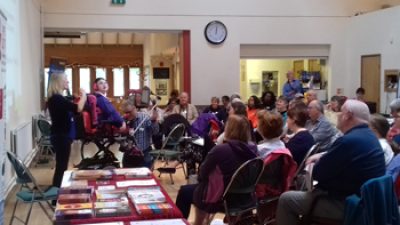
Thank you to everyone who came along to our first Roofbreaker Event (April 2018). Around 50 people joined us for the day in Ashtead for...
Insightful Bible teaching by Rev Jonathan Edwards, who told us that “The church should be the most welcoming place on earth for people with disabilities,”
Inspiring personal testimony from 15 year-old Becky Tyler, who used eye gaze technology to compile her presentation and presented it through her voice synthesizer,
Humbling stories from Ros about the exceptional pastoral care she received from her church when her disabled daughter was born, and,
Interactive discussion groups to enable people to share their own stories and ideas to encourage one another.
We've had a lot of positive feedback from attendees, with people planning to go back to their churches and raise awareness, encourage inclusion, and encourage church leaders to keep improving. Plans are afoot for future events in other areas of the country - if you're interested in becoming a roofbreaker, you can find out more by following this link.
Finding Blessings in Unexpected Places (Ros' Blog)

I’ve just returned from another trip to India. It’s my third trip; I try to go in my annual leave as often as I can. I spend the time with friends, but also with a couple of projects that they run. I always look forward to these trips, but as they draw nearer I find myself feeling a bit daunted. Sometimes, by the time I step off the plane, I’m feeling so homesick that I just want to turn round and get on the next plane back home. It’s for a mixture of reasons: Will I get sick again? Will my daughter cope with me being away? Will I be of any use or will I just be in the way? I’ve never wanted to be a “voluntourist”.
And yet as soon as I meet up with my friends and they take me back to their home, I start to feel at home and am so glad I’ve come. I fall in love again with the young ladies they’re working with. I lend a hand with some teaching, or teach the staff some techniques that will help a disabled child in their care. Best of all I get to share my testimony with them and see God at work in them.
I find it easy to sense the presence of God when I’m there, partly, I’m sure because it’s a prayer-filled home, and partly because there are none of the usual distractions that draw me away from Him. There’s no radio or TV, movie night is once a week only, and my phone doesn’t work so I can’t make calls or send texts. Stripped of these distractions it just seems easy and natural to focus on God and I do try to keep it up when I get home, turning off the radio, not taking my phone up to my bedroom, listening to worship music in the car instead of the news.
By the time my stay comes to an end I find myself reluctant to leave, and I can’t wait until the next time I go back. I’m planning another trip the same time next year. I know I will be as blessed as I have been on the previous 3 occasions.
As I was reflecting on all this, it struck me as a good analogy for my life as a parent of someone with additional needs. When my daughter was born, just over 13 weeks early, I would have given anything to be able to step into a time machine and go back to where I’d come from, happily pregnant with more than 3 months still to go. I loved the baby I’d given birth to, I had desperate hopes and prayers for her, but still, I just didn’t want to be where I was, watching her hanging onto life by a tenuous thread and waiting with bated breath to see if she would make it.
As time went on, life was fraught with difficulties, but also with unexpected joys. I often think that parents of disabled children live life to the full more than other parents. We plumb depths of anguish that thankfully most parents are spared. And yet, when you’ve been told that your child doesn’t have the intelligence ever to learn any speech and gradually she starts to come out with words, when you’ve been told she will never have the use of her arms and she finally masters picking up a spoonful of food and putting it in her mouth, things that other parents can take for granted with their children, the heights of joy experienced are beyond anything you would feel if it was a child with “normal” prospects passing regular milestones. I shall reach the end of my life feeling I have really lived, really fully experienced the gamut of human emotions, and that is thanks to my daughter. So like my trips to India, as I settle into unexpected joys and as I give to the best of my ability, I find myself receiving far more blessing than I am giving out.
And again, as with my times in India, the whole experience of being not only out of my comfort zone but totally out of my depth in my experience of parenting has done much to strip away the things that distract me away from my relationship with God and has taught me to depend on Him in situations where my own powers and resourcefulness fail me. I know that if it were not for my daughter I would not have learned to lean on God or grown close to Him in the same way.
And just as, when my time in India comes to an end, I find myself longing to go back again the next time, so my initial shock and panic about finding myself with a severely disabled child has given way to a real contentment in my relationship with her, a knowledge that she has enriched my life and that my ongoing relationship with her will continue to be a source of joy into the future, something that I look forward to with eager anticipation.
[Photo of a map of India and
Wheelsblog: Uganda 2018
A team of ten are representing Wheels for the World in Butaleja, Uganda from the 11th to the 21st April. Team Blogger, Phil, is sending back videos, photos and other reports whenever the internet connection allows, and we'll get them all online here. Please keep praying for the team, as they bring wheelchairs and other mobility aids to disabled people in Butaleja. Thank you all for your support and prayers! We're always looking for new team members, so please do contact us if you'd like to find out more. Wheels for the World is supported by your donations - please visit our donations pageto help keep the work going.
Videoblog Playlist
You can watch all of the videos so far in this playlist window - click on the menu button (three short lines) to select individual videos.
Celebrating 10,000 Chairs (the Spring 2018 Vital Link)
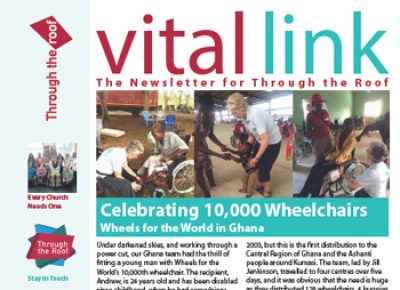
Celebrate Wheels for the World's landmark achievement of distributing 10,000 wheelchairs, find out about holidays, Wheels trips, Churches Inc work, and all the rest of our plans for the next year in the new Spring 2018 Vital Link Newsletter - available now!
- Follow this link to download the Spring 2018 Vital Link (including a standing order form) - right-click and select 'save' to save the file for later. It's a 1.5MB PDF.
Or click on the cover image below to read the Vital Link online using Joomag - you can zoom in and swap between pages much more easily that by just using a PDF reader.
Stay in Touch
We've got lots of exciting plans for the rest of the year, and we'd love to keep you up to date with everything we're doing. Sign up below to get our newsletters and other mailings.
How we use this data
We use the data you enter here to send out the Vital Link and other newsletters, and to get in touch about future events. All data is password protected.
We do not pass on your personal information to any other people or organisations, except under strict terms of confidentiality and restriction of use to organisations who supply services on behalf of Through the Roof (such as using Mailchimp to administrate sending out large numbers of newsletters), and only use it in ways that allow us to run the charity and continue our work. We do not sell your personal information. Please contact us if you would like to find out more, correct anything, or if you'd like to come off our database. Follow this link for our full terms and conditions
Stephen Hawking - A Bright Star Extinguished (Ros' Blog)
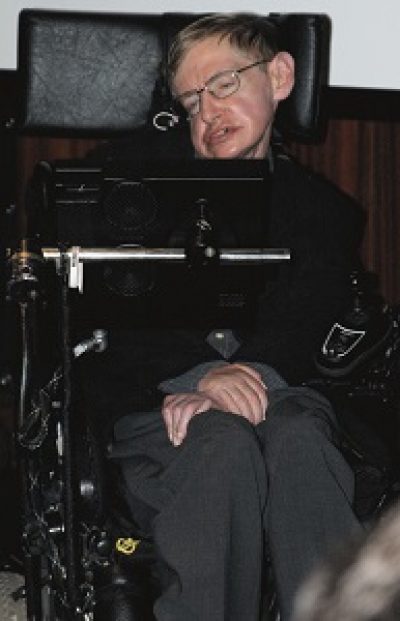
I’m sure that everyone was saddened by the news last week of the death of Professor Stephen Hawking. He is, of course, best known for his amazing advancement of knowledge and understanding in the fields of Cosmology and Theoretical Physics. But he shone as a human being in so many other ways than just his professional accomplishments.
He was a renowned wit. He was happy to take part in sketches for comic relief, as well as an episode of The Simpsons. “Life would be tragic,” he said, “if it weren’t funny.” John Oliver, the host of HBO’s “Last Week Tonight” show, known for his humorous take on current affairs, was once interviewing Professor Hawking. He mischievously asked him, “You’ve stated that you believe there could be an infinite number of parallel universes. Does that mean there’s a universe out there in which I’m smarter than you?” Hawking replied, “Yes, and also one in which you’re funny!”
It’s not uncommon to meet people with enormous intellect but a lack of human wisdom. That accusation could never have been levelled at Professor Hawking. He became famous for pithy aphorisms such as, “Quiet people have the loudest minds”; “The greatest enemy of knowledge is not ignorance, it is the illusion of knowledge”; “When one’s expectations are reduced to zero, one really does appreciate everything one does have”; and “However difficult life may seem, there is always something you can do and succeed at. It matters that you don’t just give up.”
He of all people had a right to say this. Diagnosed with Motor Neurone Disease in his early twenties and given just two years to live, no one dreamed of the stellar career that lay ahead of him, nor that he would go on surmounting one obstacle after another until the age of 76. Although the disease took its devastating course, he survived its ravages, even when the only muscles he could use to communicate were the ones in his cheek, by which he operated his voice synthesizer. He could have been excused for wallowing in self-pity, yet this was something he consistently refused to do. “It’s a waste of time to be angry about my disability,” he once said. “One has to get on with life and I haven’t done badly. People won’t have time for you if you are always angry or complaining.”
Shortly after his death I came across a debate on social media as to his eternal destiny. At one time there was speculation about whether he believed in God. In one interview, he said, “Even if there is only one possible unified theory, it is just a set of rules and equations. What is it that breathes fire into the equations and makes a universe for them to describe? The usual approach of science of constructing a mathematical model cannot answer the questions of why there should be a universe for the model to describe. Why does the universe go to all the bother of existing?” This was a question he explored in A Brief History of Time, which he concluded with the words, “However, if we discover a complete theory, it should in time be understandable by everyone, not just by a few scientists. Then we shall all, philosophers, scientists and just ordinary people, be able to take part in the discussion of the question of why it is that we and the universe exist. If we find the answer to that, it would be the ultimate triumph of human reason -- for then we should know the mind of God.”
However, he later made it clear that this was merely a figure of speech. “We are only monkeys on a small planet,” he remarked, “but we can understand the universe. That makes us somebody special.” Eventually he was very specific about his beliefs. “I believe the simplest explanation is, there is no God. No one created the universe and no one directs our fate. This leads me to a profound realisation that there probably is no heaven and no afterlife either. We have this one life to appreciate the grand design of the universe and for that, I am extremely grateful.”
In the online discussion I was following, some were adamant that, as an atheist, he had sadly forfeited his chance of eternal life. Others felt that he had been an honest seeker of truth all his life, and that God promises that those who earnestly seek Him will find Him. I’m not qualified to comment on the state of someone’s eternal soul, especially someone I never met. But I do know I have personally witnessed someone in their sixties make peace with God in the last six hours of life, and I know that God never ceases to extend mercy to us as long as we live. So I cherish a hope that somewhere Professor Hawking is face to face with the God who, for most of his life, he didn’t believe in, and finding out how very loved he is.
Emmanuel’s Story (Churches Inc in Kenya 2018)
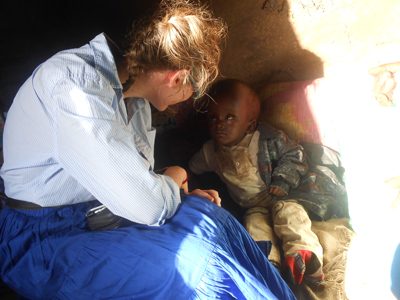
Kerry, Trevor, Pastor Shadrack, and Pastor Davis ran a Churches Inc training trip to Elburgon, Kenya from the 7th to the 17th February. You can read blog posts from the whole trip by following the links at the bottom of this article, but here's one story from Kerry of their time with a young boy and his family which really shows how Churches Inc's training is transforming attitudes, supporting the work of Wheels for the World, and helping improve people's lives.
Emmanuel is 7 years old. He lives with his blind grandmother and his auntie because his own mother ran away due to his disabilities. Emmanuel was given a wheelchair from Through the Roof’s Wheels for the World programme. However, it is not possible to use this wheelchair inside his tiny house, and sadly, his family are reluctant to use the chair to bring him outside the house, due to shame, stigma, and community attitudes.
Pastor Davis regularly visits this vulnerable family. If he lets them know he is coming, they will place Emmanuel in the chair outside to show that they are using it. They're grateful for the chair and other support he provides such as special formula from the hospital for malnourished children. But if Ps. Davis arrives unannounced, he always finds Emmanuel inside. Inside the house is not a good place for Emmanuel to be. It is very dark inside - there are no windows.
Emmanuel’s house has been badly constructed using sticks and mud. The floor and the walls are crawling with insects. When I visited, I was told not to lean on walls or sit anywhere. But Emmanuel cannot walk or move away. He is being regularly bitten by bed bugs on the old cushions where he sits. This is still an improvement from lying on the dirt floor as he did when Ps. Davis started working with the family. Emmanuel will be left to sit on these cushions all day while his auntie works to ensure the family can survive.
When I met Emmanuel, he was so desperate for interaction he moved with difficulty to bring his enlarged head onto my lap. He wanted touch and eye contact. He wanted to be loved.
This is why the Churches Inc. training trips are so important. Emmanuel already has a wheelchair, but unless attitudes are changed, he won’t be brought outside into the fresh air where he might see other people and be a part of the community. Churches Inc is working to change the attitudes that hold disabled people back, and it's a great fit with Wheels for the World's work bringing physical freedom.
Ps. Davis is raising funds to build Emmanuel a new house with windows to let in the light and space to use his wheelchair indoors and outdoors. He knows that building a new house will drastically improve the quality of Emmanuel’s day-to-day life, but he also knows that it will send a message about the value of Emmanuel’s life that will shake up this community.
He knows that other families who have relatives with disabilities behind closed doors will hear about Emmanuel’s house and come out of hiding. Pastor Davis will not be able to build them all new homes, but he will be able to help them in other ways. His heart is to transform the whole community.
- Follow this link to read the first update.
- Follow this link to read the second update
- Follow this link to see all our International Missions Blogs
Hidden Disability, Hidden Treasure (Ros' Blog)

Recently, while doing some research on disabled characters in the Bible, I came across an interesting theory, put forward by a Jewish author, that Esau may have had Attention Deficit Hyperactivity Disorder. It might explain why his mother found the foetal movements during pregnancy excessive, why he liked to be physically active, out hunting as often as possible, why his behaviour was impulsive and why he failed to anticipate the consequences of his actions. It might also explain why he married women who were likely to upset his parents without considering that it might have this effect and why, when he realised his parents were ensuring that his brother Jacob didn’t do the same thing, the penny finally dropped and he tried to make amends by taking a third wife, his cousin.
It reminded me of Ann Memmott’s suggestion that Nicodemus may have been autistic. He seemed to want to avoid socialising, and so came to Jesus at night, after the crowds had dissipated. He didn’t recognise that Jesus was speaking figuratively when he talked about being born again. Instead he took the phrase literally and asked, “How can someone be born when they are old? Surely they cannot enter a second time into their mother’s womb to be born!” He attached great importance to applying the rules, and got upset when others did not do so. He was intensely loyal to Jesus, even when this meant being misunderstood or despised. And when he prepared spices for Jesus’ burial, he got really carried away and prepared a ridiculously excessive amount – imagine carrying a weight equivalent to nearly 35 bags of sugar along the road to the tomb, an amount which, in today’s money, would be worth in the region of £200,000.
I don’t know about you, but when I think about disabled characters in the Bible, I think of Mephibosheth, or Moses with his speech defect, or the paralysed man let down through the roof to Jesus. But maybe, hidden within the pages of the Bible are other people who struggled with disability, yet whose impairments are not so visible. And when you think about it, this shouldn’t really surprise us.
Studies show that around 19% of the UK population have some kind of disability. Many of these disabilities are not visible. You can’t tell, by looking at the woman who parks in a blue badge space and walks into the supermarket, that she has fibromyalgia and on another day might not even be able to get out of her chair. You can’t tell, by looking at the puzzled commuter staring in bewilderment at his fellow passengers rushing across the bridge to another platform, that he is deaf and hasn’t heard the announcement about the change of platform. You can’t tell from watching the angry child shouting defiantly at his mother in the supermarket, that he’s autistic and the sensory overload of the retail environment is on the point of pushing him into a full blown meltdown. You can’t tell by looking at the woman occupying the priority seat on the bus that she has a heart condition which would exhaust her if she had to stand for the journey.
As in the Bible, and as in society, so in your church. There will be many people whose disabilities are concealed. Some of them will be acutely embarrassed about their impairments and will go to considerable lengths to keep them hidden.
This is why Dave Lucas of Disability and Jesus encourages churches to produce all their documents in accessible format, because there will almost certainly be some visually impaired people in the church who don’t want to embarrass themselves by asking for a special large-print version. If everybody is given the large print version, they are spared the awkward choice between declaring their impairment or not being able to read the hymns and notices. A handrail alongside the steps will benefit everybody, not just the man with cerebral palsy who finds negotiating steps a challenge where there is no handrail. Making a point of using a microphone every time not only helps those deaf people who you know about, who use the induction loop, but also those older members who aren’t yet quite ready to admit that their hearing isn’t all it used to be.
What can your church do to make sure that no one, however concealed their impairment, misses out on all you have to offer?


